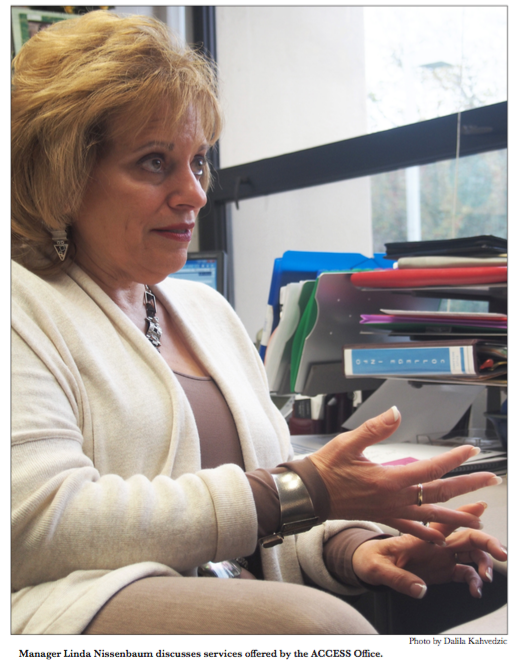Services designed to impact students’ personal and academic lives
By: CHRISTIAN HARGAS
Sports Editor
STLCC–Meramec offers services and accommodations for students with physical, psychiatric and mental disabilities through the ACCESS Office.
“We work with students who either have documented disabilities or they suspect that they might,” STLCC ACCESS Office Manager Linda Nissenbaum said. “We always make the ‘Ability’ in ‘Disability’ large because that is what we focus on. In the case that they suspect they might have a disability, we often try to provide resources where we can talk to them about what we can do to figure out what is going on.”
Available services include testingaccommodations,individual advising and academic counselling, coordination or needed classroom accommodations, interpreters, readers, writers, etc. The mission of the ACCESS Office is to provide accommodations without lowering the expectation of the student, ACCESS Office Specialist Theresa Smythe said.
“The teacher is still going to require you to take the test, still going to require you to turn in the same assignments on time, but accommodations are going to help
make up some of the limitations created by the disability. We are not watering anything down, you may just be getting a little extra time for it,” Smythe said.
Meramec student Noah Otte said he registered with the ACCESS office in the last weeks of high school.
“I did it in advance because I knew accommodations and having a person who could understand someone with a disability such as myself was crucial to my success in college,” Otte said. “I was not nervous at all when I first registered with the ACCESS Office because I knew registering could only do nothing but help me in my time in college.”
All different forms and types of disabilities are served through the ACCESS Office, Nissenbaum said. STLCC serves over 500 students per semester through their office.
“The highest [most common] disabilities are learning disabilities, Attention Deficit Disorder and psychiatric disabilities. We have a variety from visual impairments, blind,deaf,hard of hearing,physical disabilities, health disabilities — it is the whole range,” Nissenbaum said. “We serve about 52 percent of the overall population of students with disabilities that request accommodations through the Access Office district wide.”
Accommodations depend on the student and what classes they are taking, but there are times when unique challenges are presented, Smythe said.
“Teachers will sometimes feel a little bit of panic because they cannot imagine how this person is going to be able to do the work in their class with their particular disability. It is our job to troubleshoot with the teacher and figure out what is going to be a reasonable way to accommodate this student’s particular need,” Smythe said.
The accommodations are a great way to help students improve on their abilities, Otte said.
“They allow me to take a test in a good setting, make sure my math problems are correct and I need that in a subject like math that I struggle in a bit. It helps me remember key things I learned like equations. They also allow me to have a better chance at doing better on a subject not only on tests, but in a class as a whole,” Otte said.
No class is off limits for students with disabilities, but there may be essentials that students have to do in a class they are not able to do, based on their disability, Nissenbaum said.
“Most of the time, we can find a way to ensure that the student is able to do that. We have to look at what the student is requesting, how the disability affects them, what the requirements are for the class, and work with the faculty to see if we can provide an accommodation that will work in that class,” Nissenbaum said.
Otte said he uses the majority of his accommodations. There were no accommodations he needed but did not receive.
“I have used all of my accommodations I have asked for except for being able to record my lectures because I never needed it. I always received all the accommodations and help I needed whether it be in emotional or educational terms,” Otte said.
Sometimes students are not aware of the ACCESS Office because they are not told about the service, but it is a combination of things, Smythe said.
“There is some lack of awareness, but there should not be because it [information] shows up in many areas [website, course outlines, syllabus, etc.]. There is some fear and also a reluctance because a lot of students who have learning disabilities received support in grade school and high school,” Smythe said.
Now students want to go off on their own and prove to themselves they can do it. Many times that is not going to work out too well, but they try and they want to try, Smythe said.
The best thing about the services provided by the ACCESS Office is it levels the playing field and helps people who have trouble with things, Otte said.
“Whether it be in class or coping with the world, you do those things and have as good a chance at doing them as anyone not in the ACCESS Office,” Otte said. “I also feel with the ACCESS Office, students with disabilities can go to someone to talk if they have problems.”
The best part about the job is that you always have to think outside of the box, Nissenbaum said.
“All of us in this office have to think outside of the box because there is always something new that shows up. There is a new disability, or there is something that I have never heard of that comes along. Also, there may be new technology out there that provides that access.
It is about keeping up with things,” Nissenbaum said. “We have to keep up with what is going on because it is ever changing.”
Another great part about this job is that there is never a dull moment, Smythe said.
“I have been doing this for a very long time, everyone in here has, and yet we still every day meet somebody new that has some challenge we have never faced. I always feel very privileged because these are sometimes very personal things that people are dealing with that they come to us for help with,” Smythe said.
The services provided by the Access Office are fantastic, Otte said.
“I feel STLCC does a great job at effectively providing accommodations to students who need them,” Otte said.
They [ACCESS Office specialists] encourage people who either suspect that they have a disability or have a disability to register with our office and get everything set up, Nissenbaum said.
“It is always their choice what they want to use or not. We never go after students, we never force them to do anything, but this way they are set up with their accommodations and they can use them as they see fit,” Nissenbaum said. “Rather than doing it retroactively, because accommodations are not good retroactively, I would encourage students to do that upfront.”
Holding everything in confidence, they really admire the students they work with, Smythe said.
“That is probably why we are all still here because we get a lot of really positive stuff from them. They are an inspiration and this is an inspiring place to work. I do not get paid millions of dollars to do this job, but I get paid every day doing some really inspiring stuff,” Smythe said.
Students are not any less a human being or any less smart than others are because they use accommodations from the ACCESS Office, Otte said.
“I would tell them [students] it is perfectly fine to need and use accommodations, it does not make you any less than or inferior to people who do not need or use them,” Otte said. “It is really a way to help in an area you struggle in, both education wise and personally because once you start doing better, you start gaining confidence and start feeling better.”
In the end, the ACCESS Office strives for students to realize that getting equal access is their right, Nissenbaum said.
“They have a right to equal access, they have a right to these accommodations and we are here to work with them and support them in any way that we can because we want our students to succeed,” Nissenbaum said. “These accommodations are not set up for success, although we want our students to be successful. They are set up so that students have an equal chance to be successful and that they get to choose success.”












